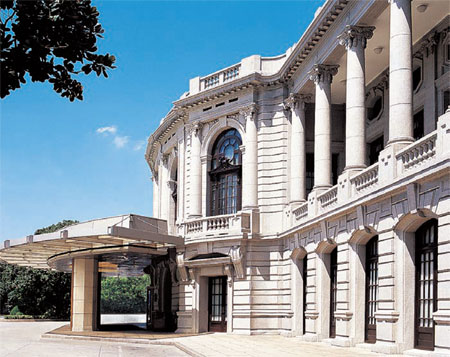More Eco-friendly
Updated: 2013-01-19 08:14
By Zhu Yile and Matthew Fulco (China Daily)
|
|||||||||||
|
The lobby of the Okura Garden Hotel, housed in the former French Club, evokes Shanghai's colorful early twentieth-century history. Provided to China Daily |
The Okura Garden Hotel is raising the stakes for sustainable hospitality in China, Zhu Yile and Matthew Fulco visit the old French Concession for a report.
Hiroshi Takata must have a green thumb. The jogging track map he designed for Shanghai's Okura Garden Hotel reads like a greatest-hits list of Japanese landscaping, with red maples, cherries, bonsai trees, plum blossoms and Japanese arrowwoods among the 30 different plant species highlighted. A numbered picture with the name of the plant in Chinese, English and Japanese corresponds to its number on the colorful map.
Takata, who took over as the Okura's general manager last July, got the idea to blend fitness and botany from daily jogs through the hotel grounds in the early morning. After three months, he mapped out the best scenic route, identifying the many plants of interest along the way.
To keep the hotel's 30,000 square-meter garden luxuriant, he ordered the implementation of an energy-saving sprinkler system, complete with a network of new underground piping. Takata expects it to be operational in time for summer weddings.
"The lawn should look pristine for wedding celebrations," he says. The Okura has long been a popular choice for weddings because of its leafy gardens and historic architecture, he adds.
While many Shanghai hotels have aimed to cash in on fashionably sustainable hospitality, the Okura seems serious about going green, offsetting its carbon footprint with a distinctly Japanese precision and technological edge.
For example, the Okura has used a centralized water purification system since its opening in 1990. That ensures tap water in guest rooms is potable, a rarity in Shanghai hotels.
"Foreign guests who drink water from the tap in their home countries feel more at home here this way," says Takata.
Since 2009, the Okura has partnered with a Japanese government entity called The New Energy and Industrial Technology Development Organization (NEDO) to curb emissions, utilizing 10 new technologies that can reduce the hotel's overall energy consumption by up to 15 percent. NEDO expects the technologies introduced, such as a solar energy system, will find widespread application throughout hotels and other commercial buildings in China.
Despite its use of advanced energy-saving technology, the Okura retains a certain old-world charm. Its lobby, housed in the former French Club - built in 1926 - evokes Shanghai's colorful Concession-era history. The building is a fine example of Art Deco style, notable for an elliptical stained-glass ceiling that is today part of the Okura's grand ballroom.
The former French Club has a rich history, indeed. During the 1940s, it was used by the U.S. Army, which installed an indoor swimming pool. After the establishment of the People's Republic of China in 1949, the building served as a "People's Culture Palace"and the garden as a sports field. The late chairman Mao Zedong stayed in the building for a time in 1959, overseeing modifications to the garden's design. Vacant for the 1960s and most of the 1970s, with the launch of China's economic reforms, the building was renamed the Jinjiang Club. From 1985, renovation commenced to create the Okura Hotel. Renovation was completed in 1989 and the Okura opened the following year.
To highlight the former French Club's history, the Okura will present a photo exhibition in the coming months depicting the building at different stages over the years, Takata says.
"While Japanese-managed, the Okura is very much a local hotel at heart," he says. "We are fortunate to have such a well-preserved piece of Shanghai's history (The former French Club) as an essential part of the property."
Contact the writers at zhuyile@chinadaily.com.cn and matthew.fulco@chinadaily.com.cn.
Today's Top News
Police continue manhunt for 2nd bombing suspect
H7N9 flu transmission studied
8% growth predicted for Q2
Nuke reactor gets foreign contract
First couple on Time's list of most influential
'Green' awareness levels drop in Beijing
Palace Museum spruces up
Trading channels 'need to broaden'
Hot Topics
Lunar probe , China growth forecasts, Emission rules get tougher, China seen through 'colored lens', International board,
Editor's Picks

|

|

|

|

|

|






